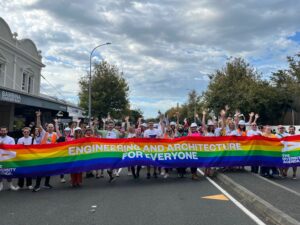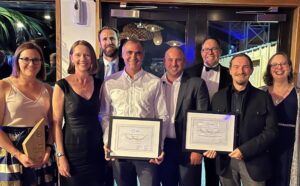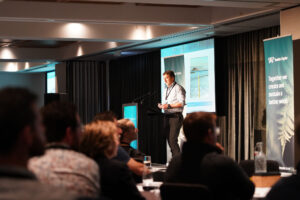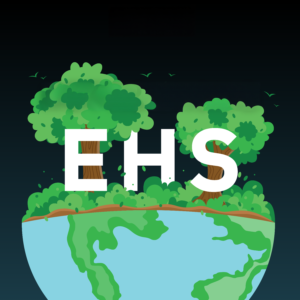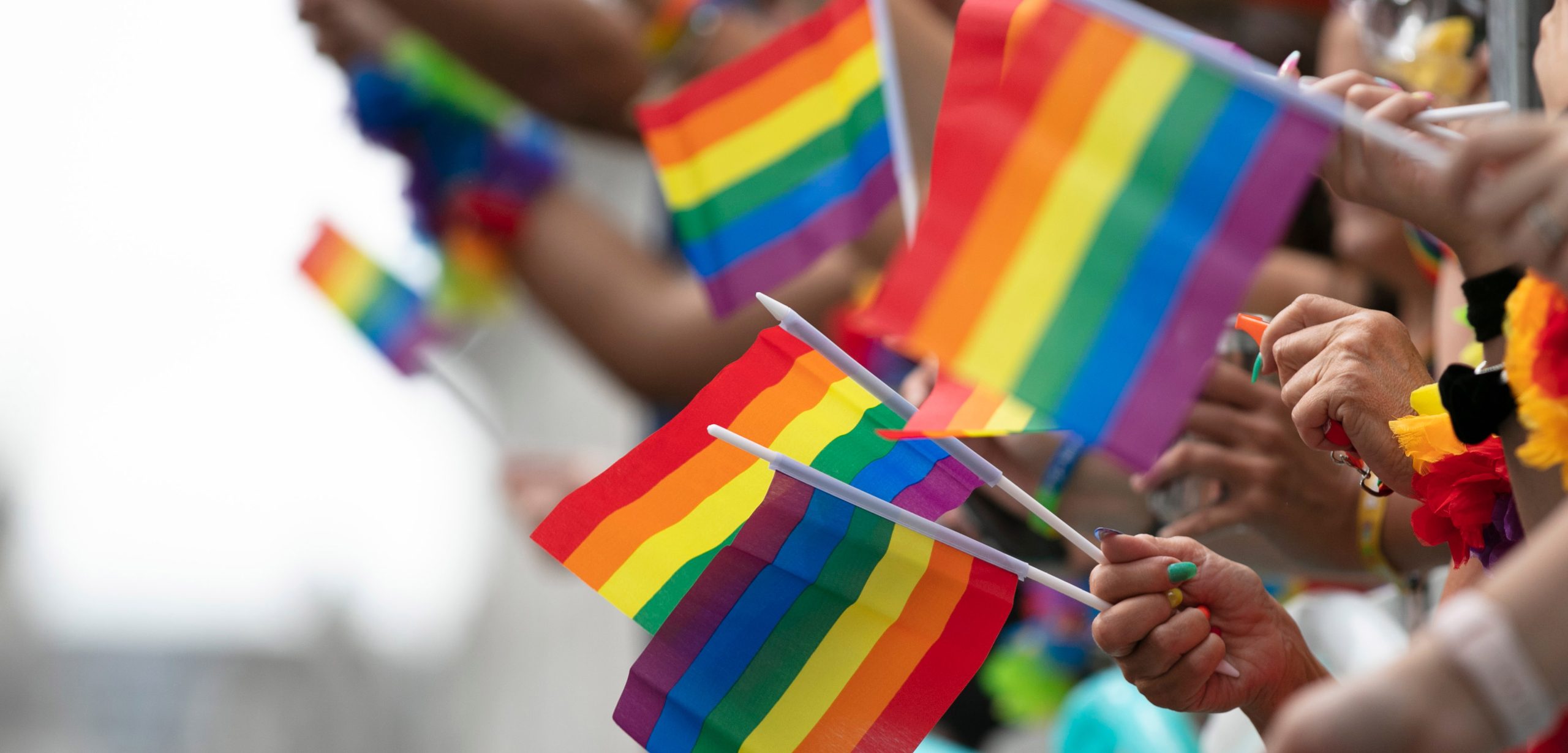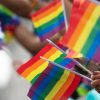31 March marks International Transgender Day of Visibility, where we celebrate the courage, resilience, and contributions of transgender and gender-diverse people worldwide.
Visibility is powerful; it fosters understanding, challenges stereotypes, and creates space for inclusion.
We believe in fostering a workplace where everyone feels safe, valued, and respected for who they are. This day is a reminder of the progress made, and the work still needed to ensure true equity and acceptance.
Everyone Matters at Tonkin + Taylor, and to acknowledge International Transgender Day of Visibility, members of our Rainbow Committee share what the day means to them:
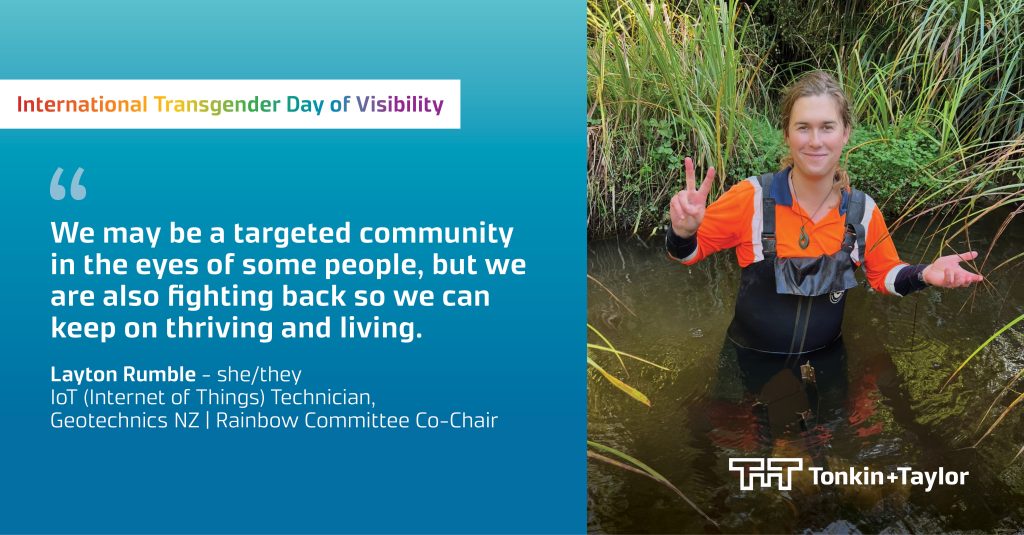
Layton Florence Rumble (she/they)
IoT (Internet of Things) Technician, Geotechnics NZ | Rainbow Committee Co-Chair
What does International Transgender Day of Visibility mean to you?
International Transgender Day of Visibility means a lot to me for creating proper visibility for our successes and issues. We may be a targeted community in the eyes of some people, but we are also fighting hard to keep thriving and living.
What challenges have you faced and how have you overcome them?
One challenge I have faced is unlearning habits and learnt behaviour from being socialised as a male and learning a lot of how to do things from others and myself as I transition to female. It isn’t something you learn overnight or know real written code of how to do things.
What is one thing your peers can do to ensure better inclusion of the transgender community within Tonkin + Taylor Group?
Using people’s correct pronouns and if you make mistakes, apologise, correct yourself and move on. When the one who gets it wrong makes a bigger deal out of it, it just makes it worse.
What is a common misconception you want to debunk?
There are a lot of misconceptions around trans people where there are cisgendered (non-transgender) people directing narratives of our own lived experiences. The best source for knowledge if people have questions is merely ask us or do your own research from trans sources.
This time next year, what do you hope has changed for the better?
Always hoping for better healthcare and support. It is shocking the lack of studies for women’s health let alone trans healthcare.
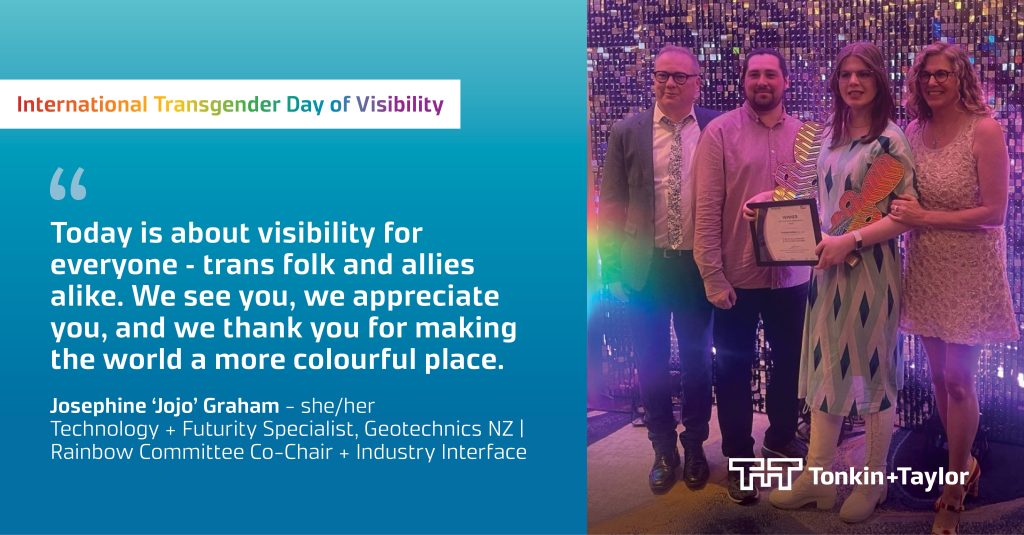
Josephine “Jojo” Graham (she/her)
Technology & Futurity Specialist, Geotechnics NZ | Rainbow Committee Co-Chair and Industry Interface
In 2024, Josephine won the Chorus Ambassadorship Award at the NZ Pride Pledge Awards for efforts supporting Tonkin + Taylor Group and our wider industry.
What does International Transgender Day of Visibility mean to you?
This day is a chance to celebrate the vibrancy and variety within our community. Visibility is not just a celebration of authenticity, it includes advocacy – we don’t exist in workplaces, communities, or in the world without allies and supporters around us.
To that end, today is about visibility for everyone – trans folk and allies alike. We see you, we appreciate you, and we thank you for making the world a more colourful place.
What challenges have you faced and how have you overcome them?
Electrolysis might be one of the hardest. I have so far spent more than 50 hours getting individual hair follicles burned out and plucked from my face. It is expensive, it isn’t glamorous, but I’m almost halfway there. The worst part, more than the pain and recovery, is the isolation. It can be immensely tricky to work up the nerve to socialise when I look like I’ve fallen face-first into a hedgehog nest!
What is one thing your peers can do to ensure better inclusion of the transgender community within Tonkin + Taylor Group?
If you think a stranger might be trans, don’t bring it up – even to show your support – unless they bring it up first. Even as a trans woman, I never ask folk about that directly until we’re friends – even if I know it to be true.
What is a common misconception you want to debunk?
Changing hormones to oestrogen or testosterone doesn’t automatically change your voice – most trans folk need to train themselves to speak in their preferred register, and this can be time consuming. Some even put voice training in the ‘too-hard basket’ or choose not to change at all! If you hear us sounding different from what you expected, if our tone is off or we sound strange – don’t take it personally, we may just be relearning how to speak.
This time next year, what do you hope has changed for the better?
I hope trans folk around the world find safe refuge. I hope we have more visible trans leaders in our communities, institutions, and government bodies. I hope the next generation of trans youth aren’t driven back into the closet. I hope love will win.
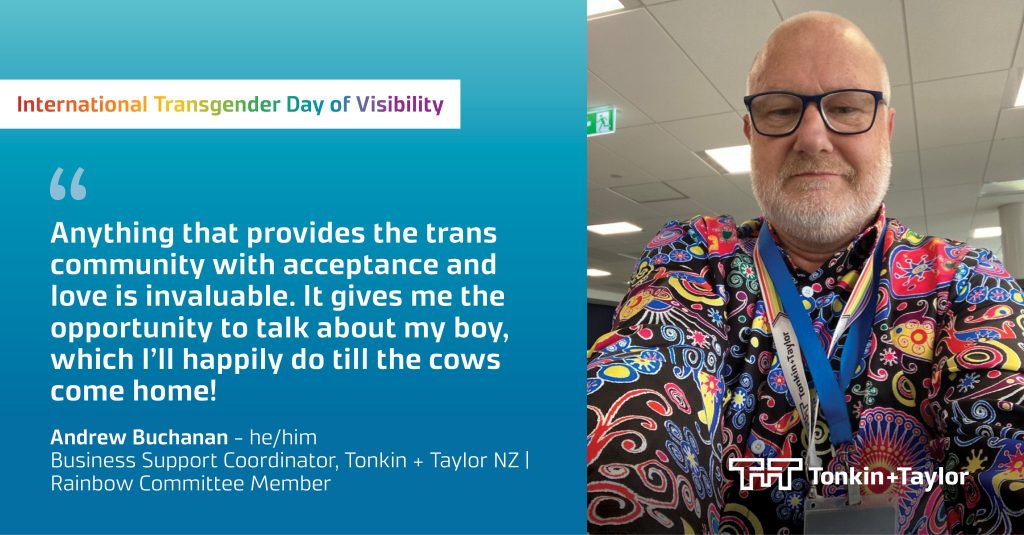
Andrew Buchanan (he/him)
Business Support Coordinator, Tonkin + Taylor NZ | Rainbow Committee Member
What does International Transgender Day of Visibility mean to you?
As the dad of a transgender son, this day means a huge amount to me and my whānau. We live in difficult times here and internationally, and anything that provides the trans community with acceptance and love is invaluable. It gives me the opportunity to talk about my boy, which I’ll happily do till the cows come home!
What challenges do you face as a parent of a transgender child?
The horrible realisation, when hearing some people’s stories, that we’ve still got so far to go. That, and the bewilderment on my son’s face as he tries to comprehend the hell that some of his friends have faced.
What is one thing your peers can do to ensure better inclusion of the transgender community within Tonkin + Taylor Group?
Just getting involved by being an ally. Let people know you’ve got their backs. Spread the word about Tonkin + Taylor’s support of its trans community. Be visible in support.
_____________________________________
What are pronouns (or gender pronouns, preferred gender pronouns)?
We use pronouns in language all the time to refer to ourselves or other people, for example:
- she/her/hers – for someone who might identify as female
- he/him/his – for someone who might identify as male
- they/them/their – for multiple people or someone who might not identify strictly as male or female, these pronouns are considered ‘gender neutral’
Policies + Guidelines
Our staff have access to a number of resources internally, these include: our LGBTTQIA+ Guidelines, and the Gender Affirmation Guidelines which are currently being updated. Our policies and initiatives are designed to support all individuals across the group, including:








